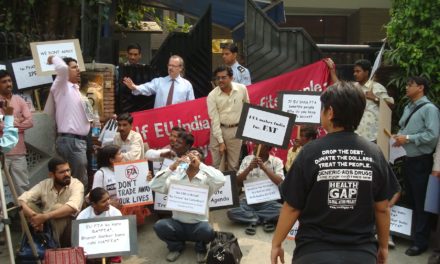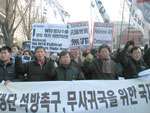In what appears to have become standard practice at the World Trade Organization (WTO), the WTO negotiating committee chair on Non-Agricultural Market Access (NAMA) has ignored the clear and adamant voices of developing countries in putting forward a text that only reflects the interests of powerful developed countries.
‘The report is not so much an assessment of the actual state of play, where there actually is huge and widening divergence on the critical issues, but a reflection of the state of power play in the NAMA negotiations-where the interests of the developed countries could once again triumph over those of developing countries,’ said Focus on the Global South’s Joseph Purugganan.
The text completely neglects the priorities of the world’s developing countries, which legitimately fear the prospect of losing control of their domestic industries under the NAMA agreement. Instead it is solely concerned with aggressive market access by highly industrialized countries via an unmanageable regime of tariff reductions.
‘It is blatantly obvious that there is no possibility for a good deal at the WTO. Developing countries should collectively reject what is on offer. This text again proves that the WTO is unable and unwilling to provide development outcomes for the poor,’ said Purugganan.
Developing country concerns ignored:
– Tariff reduction formulas. Formulas currently being considered would amount to drastic tariff cuts for developing countries thereby exposing their industrial sectors to an onslaught of foreign companies and undermining industrial sectors vital to their development needs. Further, the actual (coefficient) numbers quoted in the report do not reflect the reality of the negotiations.
– Linking of formula and flexibilities. The tariff reduction formula and the so-called ‘paragraph 8 flexibilities’ are considered linked in the text. This is contrary to the views expressed by developing countries that the flexibilities are ‘stand alone’ provisions. This is an attempt to extract concessions in either or both areas from developing countries.
– Binding of unbound tariff lines. Developing countries have consistently raised serious concerns over binding of unbound tariffs. The Philippines for example would be forced to now bind more than 39 % of its products previously outside the ambit of the WTO. This would include 95% of tariff lines for fisheries that are still unbound.
– Sectoral Negotiations. These negotiations are of serious concern to developing countries because of the potential erosion of preferences and the sensitivity and vulnerability of some sectors, including fisheries and forestry.
These issues are unlikely to be yielded by developing countries. Yet, in the guise of providing focus to the negotiations, the entire NAMA report seeks to ignore these divergent positions and downplay the fact that NAMA negotiations are really on the verge of collapse.
Said Purugganan, ‘The report is clearly an attempt to lock-in progress in whatever areas of convergence, no matter how vague and insignificant. It steers clear of more contentious issues and reduces it to a numbers game in order to save the negotiation and allow it to continue beyond Hong Kong. This biased approach to negotiations must be halted.’
NOTE TO JOURNALISTS: A FOCUS ON THE GLOBAL SOUTH FACT SHEET FROM WHICH THIS MEDIA RELEASE IS DRAWN IS AVAILABLE UPON REQUEST.
For further information or to arrange an interview with Joseph Purugganan, please contact Brett Solomon + 66 7 059 1713 (Bangkok) or Joseph Purugganan + 63 917 387 4531 (Philippines) www.focusweb.org









